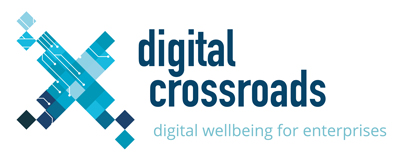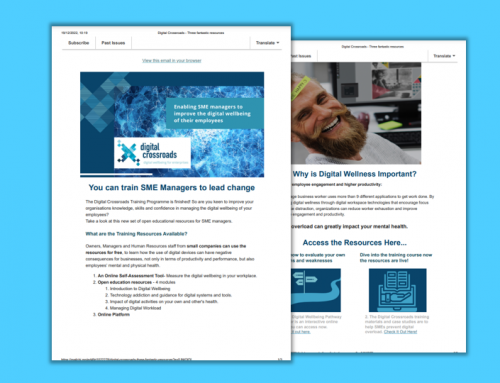How small businesses can make big changes to improve employee wellbeing
In corporate environments, the mental wellbeing of staff was already a core priority for Human Resource departments, before the Covid-19 pandemic forced organisations to focus on this aspect of health in a whole new way.
In July 2021 CIPD published a review of the “best available evidence” on whether digital work harms mental wellbeing, presenting a summary of research and expert views from HR professionals. In this blog for Digital Crossroads, Amy Knight from National Enterprise Network considers how to apply this evidence to helping small businesses, where HR matters often fall to a single Manager or micro business owner.
Let’s take 3 issues that affect digital wellbeing and look at how SME Managers can effectively tackle each of them.
Issue 1: Working long hours
Feeling under pressure to spend more and more time working can have a major influence on mental wellbeing. In the digital age many employees report feeling like they have to be ‘always on’ and poor work-life balance is closely linked to unmanageable workloads.
Design a way through
SME Managers need to support employees to achieve a work-life balance in order to protect their mental health. In larger companies, it is easier to distribute responsibilities to spread the load. In micro enterprises and small businesses where teams are small, there simply isn’t anyone there to pick up the slack. What SME Managers can do more easily than leaders in large corporates is design jobs to make them manageable for that individual. The more autonomy you can give your staff, the more empowered they feel to control their own work methods and manage their own schedule. Flexibility is seen as a key advantage to working for a small company compared with a large organisation.
Issue 2: Toxic social media
Social media trolling is a form of bullying and harassment that occurs online, and can be a significant risk factor in mental wellbeing. Social media is known to be addictive, even when the experience of social media interaction is negative.
Strengthen workplace relationships
All employers have a responsibility to strengthen workplace relationships, and this is often less of a challenge for close-knit SME teams. However, managers still need to work hard to build strong, positive teams, particularly when most working interactions are conducted remotely. Consider each individual team member: if they were struggling, is there someone they would feel able to ask for help? Low self-esteem and poor emotional wellbeing can be symptomatic of social media bullying. If SME managers invest in building strong relationships, they are more likely to be able guide and support individuals to find appropriate help and resources.
Issue 3: Digital overload
Any of us, whatever our role, can be overwhelmed by the number of emails we receive and the number of Zoom calls we have scheduled, and the difficulty in disconnecting from work because of mobile technology.
Co-create healthy habits
In small businesses, Managers can involve their employees in the creation of policies and “healthy habits”, agreeing between yourselves what you would consider “excessive” working hours. Setting policies and expectations that deter an ‘always-on’ work climate can be really helpful, such as agreeing that no one is expected to reply to an email sent after 6pm.
Good news for SME Managers
One of the conclusions drawn in the CIPD report is that “there is a good case for delegating or pushing control down the hierarchy as much as is appropriate”, because increasing autonomy at work can improve mental wellbeing. The good news is that SME Managers can achieve this more readily than leaders of much larger organisations, as small businesses naturally have less “tiers” to their organisational structure. If you own or manage a small business, you can design flexible roles for each of your team in a way that protects their digital wellness and maximises their performance.
You can download the mental Wellbeing and Digital Work Evidence Review published by CIPD here:
Mental wellbeing and digital work: an evidence review: Evidence Summary (cipd.co.uk)





